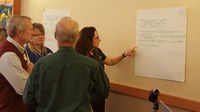NDSU Extension Uses Community Forums as Listening Opportunities
(Click the image below to view a high-resolution image that can be downloaded)
North Dakotans are helping shape the programming the North Dakota State University Extension Service offers.
Last fall, Extension invited residents to 11 community forums throughout the state to share their concerns in two main areas: agriculture, energy, natural resources and the economy; and children, families and communities.
“The NDSU Extension Service is working hard in 53 county-based sites in North Dakota to strengthen the capacity of youth, families, farms, businesses and communities to address the issues that are vital to their long-term well-being,” Extension Director Chris Boerboom says. “NDSU Extension staff recognize that to be most effective, they need to listen to local stakeholders and regularly ask about crucial issues and challenges affecting each region.”
Input from the community forum participants will help guide Extension’s strategic planning efforts in the next three to five years. This information also helps Extension create programs that most strongly align with people’s needs and priorities.
“I thought the community forum concept was great,” says Hazelton Auditor Angie Benz, one of more than 300 people who attended the forums. “It allowed people to get their concerns out in a way that every person would be heard.”
One of her major concerns is that because of competition from corporate farms, people have difficulty in becoming a farmer or rancher if they aren’t able to take over an existing operation.
“It’s a huge issue in our rural areas,” she says.
The community forum participants ranged from those who had lived in their community less than a year (3 percent) to those who had lived there more than 20 years (35 percent) or their entire life (33 percent). Those attending the forums also ranged from high school students such as Dawson Schefter to those 69 and older, with the most (27 percent) in the 50-to-59 category.
“I attended the forum as an opportunity to share a youth perspective to the problems surrounding our communities and our state as a whole,” says Schefter, a Langdon Area High School junior.
He spoke about a lack of leadership guided by ethics and morals, a decline in youth leadership and interest in pursuing leadership positions after high school, and the need for relevant technology in the state’s classrooms.
“I feel that the people that attended were very open about their concerns,” Benz says. “We talked about drugs, poverty and other issues that aren't easily talked about.”
Here are brief descriptions of the participants’ top concerns when summarized across the state:
- Agricultural economy - current prices a major challenge; more diversification and value-added products needed
- Public disconnect with agriculture - need consumer education programs
- Energy development - fluctuating oil prices can cause dramatic shifts in the state’s economy, and energy development brings challenges to communities and infrastructure
- Farm/business transition - successful transition from one generation to the next is vital
- Labor force - need adequate wages and benefits, and communities with high-quality services
- Natural resources protection - including using more renewables and expanding recycling programs
- Regulations - oversight or flexibility at the state or local level is preferable to one-size-fits-all federal regulations
- Rural communities - keep small communities viable through economic development, infrastructure updates and succession planning for businesses
- Health and wellness - need access to high-quality health care, nutritious foods and exercise programs
- Civic engagement - need to strengthen participation and commitment at the local level
- Successful families - families are struggling financially and bombarded with competing priorities that limit family time; good-quality child care hard to find
- Infrastructure - housing, roads, child-care facilities, schools and public buildings need attention
- Crime and safety - crime increasing, particularly in western North Dakota; cyber-bullying and sexting also increasing
- Education - pre-kindergarten through grade 12 educational system needs additional support, including more teachers and programs; unstable school enrollment also a problem
In response, Extension has developed a list of potential programming in three key areas: economic prosperity, community engagement and healthy citizens. Extension will seek additional funding through the State Board of Agricultural Research and Education and state Legislature to develop educational programs to respond to these needs. In the meantime, Extension is asking teams of its state and area specialists, agents and other staff to submit proposals for funding for programming to address the needs in these three areas.
“While NDSU Extension may not be able to directly follow through with the solutions proposed in the community forums, I believe that the forums served as an important first step to discussing issues that might not otherwise come to light,” Schefter says.
As a result of what they heard at the forums, Benz and Schefter have initiated efforts to deal with what they say is an important issue: getting youth more involved.
Benz and the other members of a committee working on a regional economic development plan have conducted community forums in Napoleon for youth to learn to be civically engaged.
“The kids were engaged in the process and learned that they do have a voice,” she says. “They are even working on a grant application for sidewalks in Napoleon.”
Schefter, who is president of the North Dakota Association of Student Councils, started an initiative to ensure that students have a voice in their education.
“I believe that it is important for today’s students to learn the valuable skills which will enable them to become the next generation of leaders,” he says.
Visit http://tinyurl.com/ExtCommunityforums for a full report on the forum participants’ priority issues of concern and Extension’s response.
NDSU Agriculture Communication - March 14, 2016
| Source: | Chris Boerboom, (701) 231-8944, chris.boerboom@ndsu.edu |
|---|---|
| Editor: | Ellen Crawford, (701) 231-5391, ellen.crawford@ndsu.edu |


